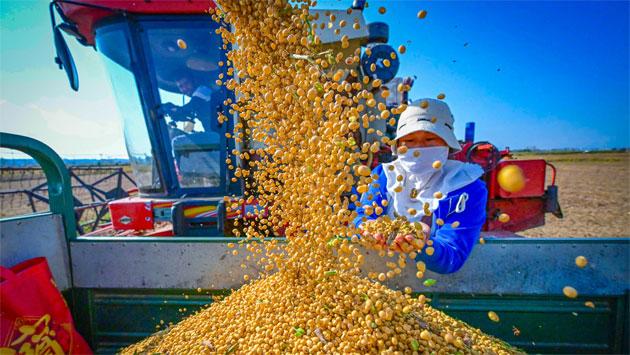10 Jul 2024 - {{hitsCtrl.values.hits}}
 As the number of farmers dwindles and arable land decreases, Beijing is once again confronted with the pressing issue of food security. This challenge, deeply rooted in China's socio-economic fabric, demands urgent attention and strategic solutions to ensure the sustenance of its vast population.
As the number of farmers dwindles and arable land decreases, Beijing is once again confronted with the pressing issue of food security. This challenge, deeply rooted in China's socio-economic fabric, demands urgent attention and strategic solutions to ensure the sustenance of its vast population.
Economic indicators in China are undergoing a significant negative shift, including a stagnating GDP, a decline in productivity per person, an aging population straining the economy, and a youth unemployment rate nearing 50%. A significant portion of the global community is considering relocating their manufacturing bases from China to more business-friendly environments, like India and Vietnam. Concurrently, an unprecedented number of China’s wealthy individuals are emigrating to the United States.
China is also grappling with another pivotal macroeconomic challenge that resurrects specters from its history. As strains escalate between China and its primary Western grain providers, coupled with the Ukrainian conflict and supply chain interruptions, China faces a potential food security crisis reminiscent of those in its past. In 2022, public demonstrations against food shortages were witnessed in China for the first time since 1989.
Recurrent food deficits, starvation, and famines have historically been a persistent dread under the Chinese Communist Party’s (CCP) governance and have been the primary cause of political and civil unrest. CCP leader Xi Jinping, aware of the political perils a food crisis can trigger, has prioritized food security in his administration’s agenda. From 2000 to 2020, the nation’s food self-sufficiency ratio plummeted from 93.6% to 65.8%.
China's food insecurity stems from various structural and policy factors. Despite possessing only 10% of the world's arable land and 6% of its water resources, China must feed 20% of the global population. These enduring challenges contribute to the country's persistent food security issues.
Policy factors have historically influenced China's food insecurity. During the Great Leap Forward (1958-1962), inefficient agricultural practices, including forced collectivization and the displacement of skilled farmers, led to resource misallocation and subsequent food shortages. Natural disasters like floods and droughts exacerbated these issues, culminating in the Great Famine, which resulted in the starvation deaths of tens of millions.
In the late 1970s, Deng Xiaoping initiated agricultural reforms, reinstating private land ownership and permitting farmers to sell surplus crops. This shift towards profit-driven farming enhanced efficiency and increased food production. However, challenges persist due to various negative factors.
Presently, China depends heavily on external sources for its food supply. The middle class favors a diet rich in meat, sugar, and refined grains over the traditional vegetable-centric diet, with meat consumption tripling since 1990. Additionally, the productivity of China's agricultural sector is declining due to pollution and overexploitation, reducing cultivable land.
A 2021 study revealed that by 2019, China's total arable land had shrunk by nearly 6% from the previous decade. Food safety is also a pressing issue, with widespread distrust in domestically produced food leading consumers to prefer foreign food. Younger Chinese gravitate towards urban life and higher-paying jobs, while older farmers retire, leading to a labor shortage in farming and related sectors.
China's dependence on foreign food supplies is evident as it becomes the world's largest corn importer and the largest global importer of agricultural goods. China is also acquiring farmland overseas to mitigate food security risks. The CCP recognizes the impact of global events, like the Russia-Ukraine war, on food prices and supply, underscoring the importance of food security.
China also grapples with widespread corruption among officials, skewing official planning documents and undermining policy effectiveness. Recent anti-corruption drives have led to the arrest of numerous officials within China's grain reserve system.
In response to food security concerns, China's National Food and Strategic Reserves Administration has bolstered its grain reserves to unprecedented levels. This underscores the gravity of food security for China and the CCP, with officials recognizing that their authority and privileges depend on ensuring the sustenance of the 1.4 billion people they govern.
23 Dec 2024 9 hours ago
23 Dec 2024 23 Dec 2024
23 Dec 2024 23 Dec 2024
23 Dec 2024 23 Dec 2024